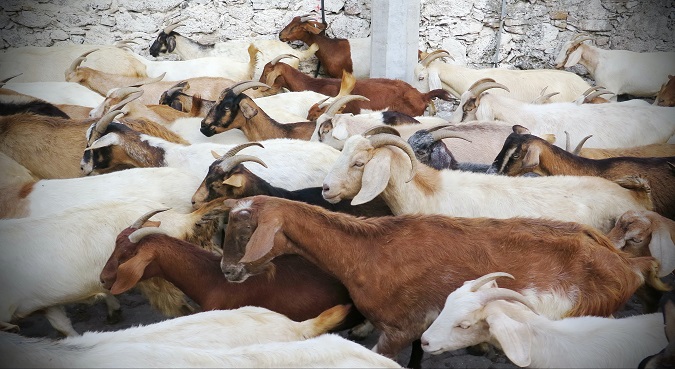
It’s not uncommon for goats to suffer from scours, or diarrhea. In kids, scours can soon prove fatal if not treated promptly. How to treat goat scours depends on the cause, which includes parasite infestation or various bacterial infections. Call your veterinarian at the first indication of scours in your goats.
Diarrhea in Goats
In addition to scours, affected goats might appear weak and depressed. They might stop eating and become dehydrated. Without treatment, a goat might experience convulsions and die. Even before you know exactly what’s causing the scours, separate any symptomatic goats from the herd. Preventing scours consists primarily of providing a clean environment for your herd, along with fresh, clean water and quality hay and feed. If you have expectant does, make sure they give birth in clean pens and that the area is warm enough for newborn kids. The latter are most likely to succumb from scours.
Neonatal Scours
Severe scours can kill newborn kids in less than a day. Mild scours often occur in kids, so don’t panic if the neonate experiences loose feces. If the scouring becomes profuse, you’re dealing with an emergency. The most common pathogen involved in neonatal scours is Escherichia coli, but other bacteria or viruses can cause scours in newborns. The kid requires fluid therapy to replace those lost from scours. Your vet might prescribe antibiotics for bacterial infections, along with giving the kid probiotics to restore good bacteria to the gut.
Coccidiosis in Goats
Diarrhea in newly weaned kids could result from coccidiosis. While coccidia, an intestinal parasite, is present in small numbers in most goats, weaning stress can cause an outbreak in susceptible kids. Your vet diagnoses coccidiosis based on a fecal examination and the goat’s general condition. To prevent outbreaks, you can give your goats a commercial feed containing medications that will kill coccidia. Once an outbreak starts and you’ve isolated affected goats, your vet might prescribe sulfa drugs for early-stage symptoms. He also might recommend drenching your goats for five days with the cattle drug amprolium. Although that medication is not approved for use in goats by the U.S. Food and Drug Administration, a veterinarian can prescribe it “off-label.”
Enterotoxaemia
Often called overeating disease, can strike any goat. The bacteria Clostridium perfringens, either type C or D, is the culprit, but small amounts of these organisms normally inhabit the caprine intestinal tract. The condition received its nickname because the general trigger is some sort of dietary change. Goats suffering from enterotoxaemia might have bloody diarrhea. They stop eating and exhibit abdominal pain. Often, goats fall over and soon die. A mild bout might respond to analgesic medications, oral electrolytes, or a dose of probiotics. Seriously ill goats might recover if given antibiotics and intravenous fluids. Fortunately, a vaccine against enterotoxaemia is available and is part of standard goat inoculation protocol.
Related Articles
Foods That Are Not Safe or Good for a Horse
The Differences Between True Service Animals and Other Support Animals


Comment here